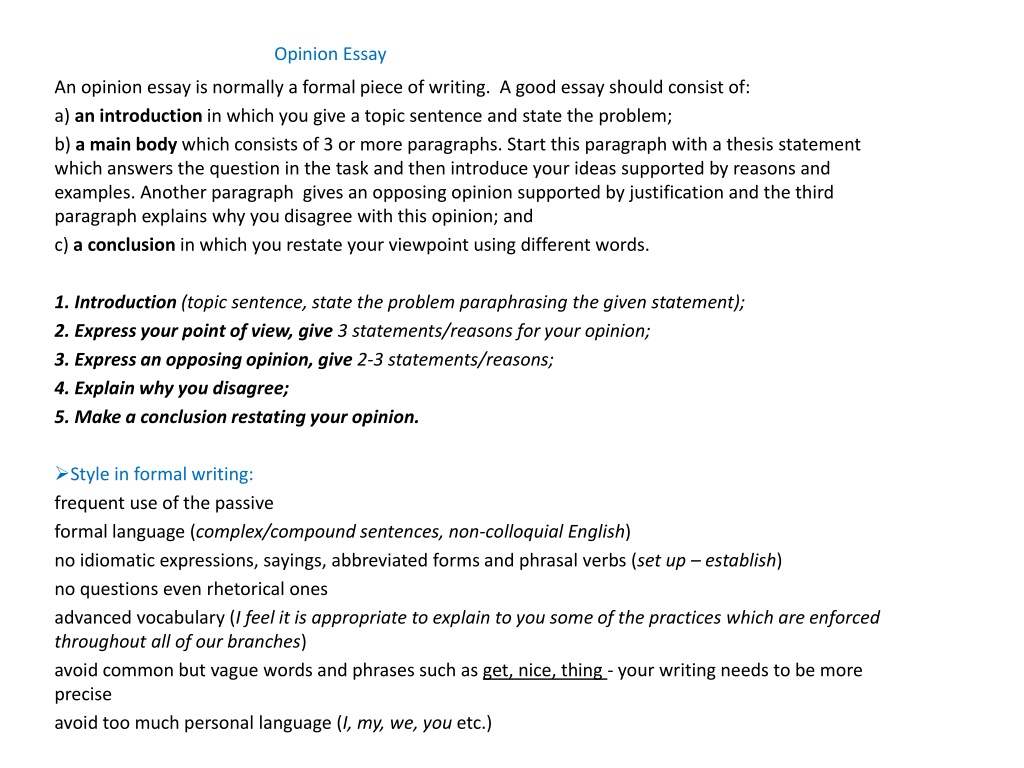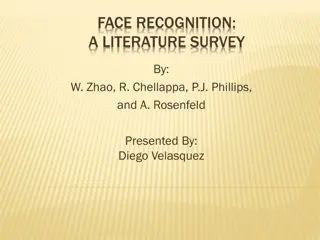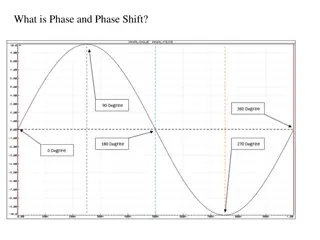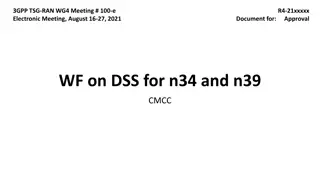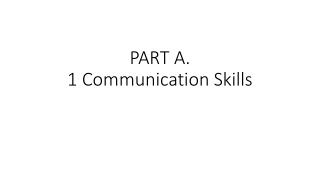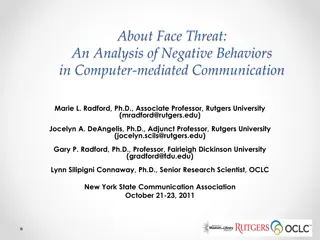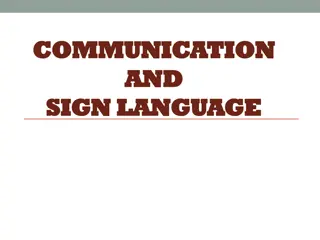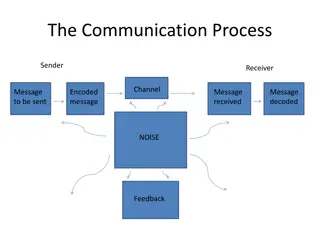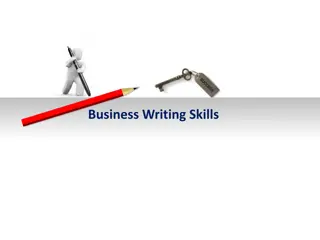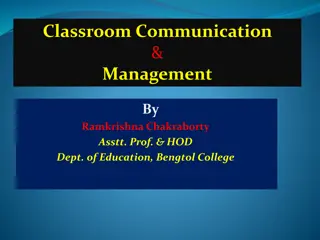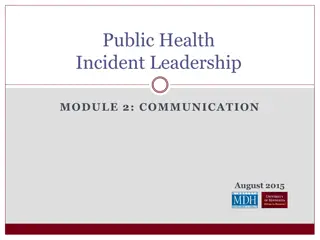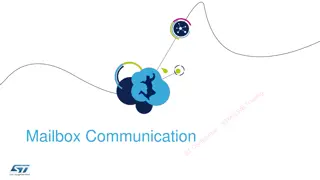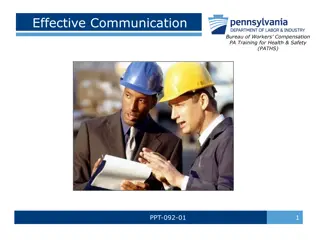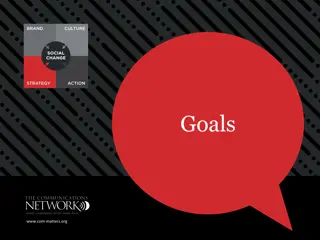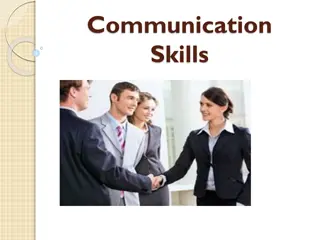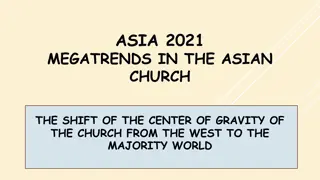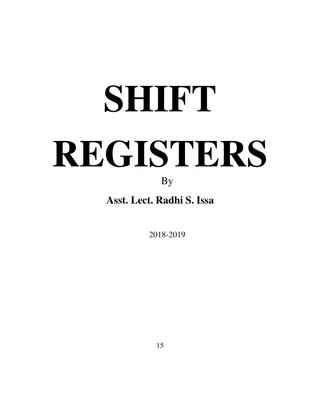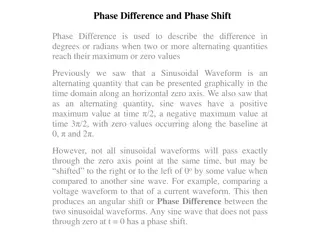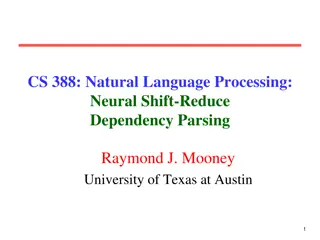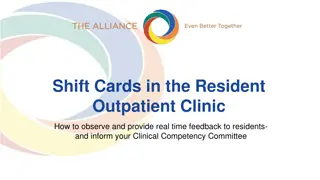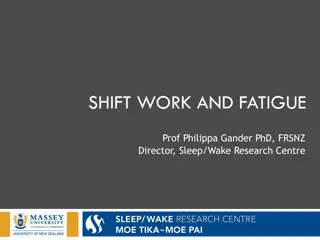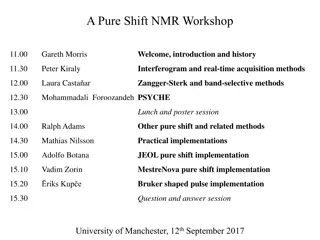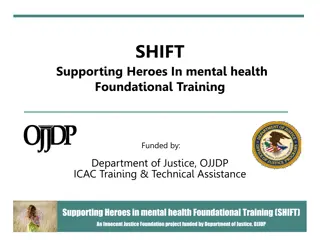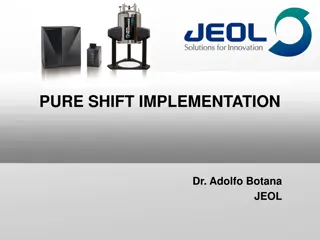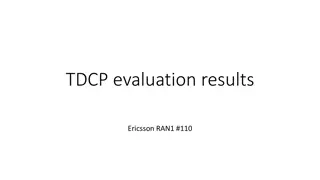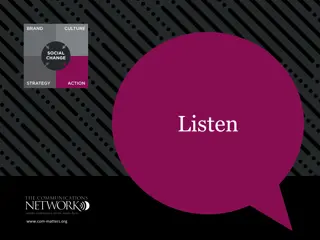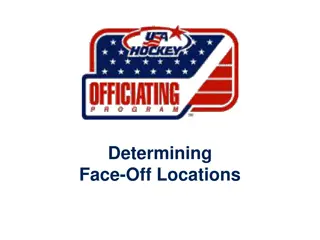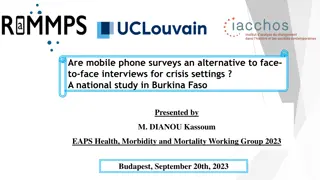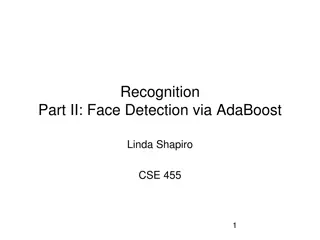The Shift from Face-to-Face to Online Communication
Internet-based communication is gaining preference over face-to-face interactions due to its instant connectivity across borders. While social media platforms like Facebook and Twitter dominate, some argue that online chat is a waste of time. This essay explores the increasing popularity of virtual communication and presents a contrasting view on the potential drawbacks.
Download Presentation

Please find below an Image/Link to download the presentation.
The content on the website is provided AS IS for your information and personal use only. It may not be sold, licensed, or shared on other websites without obtaining consent from the author. Download presentation by click this link. If you encounter any issues during the download, it is possible that the publisher has removed the file from their server.
E N D
Presentation Transcript
Opinion Essay An opinion essay is normally a formal piece of writing. A good essay should consist of: a) an introduction in which you give a topic sentence and state the problem; b) a main body which consists of 3 or more paragraphs. Start this paragraph with a thesis statement which answers the question in the task and then introduce your ideas supported by reasons and examples. Another paragraph gives an opposing opinion supported by justification and the third paragraph explains why you disagree with this opinion; and c) a conclusion in which you restate your viewpoint using different words. 1. Introduction (topic sentence, state the problem paraphrasing the given statement); 2. Express your point of view, give 3 statements/reasons for your opinion; 3. Express an opposing opinion, give 2-3 statements/reasons; 4. Explain why you disagree; 5. Make a conclusion restating your opinion. Style in formal writing: frequent use of the passive formal language (complex/compound sentences, non-colloquial English) no idiomatic expressions, sayings, abbreviated forms and phrasal verbs (set up establish) no questions even rhetorical ones advanced vocabulary (I feel it is appropriate to explain to you some of the practices which are enforced throughout all of our branches) avoid common but vague words and phrases such as get, nice, thing - your writing needs to be more precise avoid too much personal language (I, my, we, you etc.)
Introductory phrases: It is popularly believed that, People are often convinced that, Some people argue that, A lot of/Many people think/claim that, The issue/question of is actual/debatable/controversial nowadays as/because , It is common knowledge that ; To express opinion: I personally believe, In my opinion, I definitely think, In my view, I am convinced that for a number of reasons, I strongly disagree; To introduce different reasons: First of all, To start/begin with, Firstly/Secondly/Thirdly, What is more, In addition, On the one hand, Furthermore, Moreover, Besides, Apart from, Another thing to mention, Another advantage of/to ; To introduce an opposing opinion: However, On the other hand, Some people argue that, There are people who oppose, Nevertheless, Nonetheless; To introduce your disagreement: I do not fully support the above ideas because, It is true that but, Contrary to what some people believe, whereas, in fact; To conclude, summarise: In conclusion, To sum up, All in all, All things considered, Taking everything into consideration/account Useful language for opinion essay
Comment on the following statement: Internet-based communication is becoming more preferable to face-to-face communication. Do you agree or disagree? Today, communication tools have bridged the gap between different countries. Internet communication ensures an instant connection between people on opposite sides of the world. The idea that chatting on the Internet can replace real-life communication is becoming more and more popular each year. Social networks such as Facebook and Twitter take over our lives at a meteoric speed and nobody really objects to them. However, I do think that chatting on the Internet is a sheer waste of time. First of all, this means of communication deprives us of a possibility to really interact with a person we are speaking to owing to the fact that emotions can be easily hidden under words and smileys. Moreover, not only do we fail to understand somebody completely, but we also forget all the necessary skills of speaking in public. It can often lead to us being shy and withdrawn when we have to talk with somebody. Nonetheless, opponents argue that sharing information via the Internet is both faster and more convenient as you can find everything you want without even lifting a finger. They consider it to be vital and inevitable in our fast-moving world. Furthermore, it provides opportunities for long-distance families and friends to keep in touch on a daily basis. Despite this widespread belief, I adhere to my own standpoint. There are other means of communication including speaking by phone, for instance, that can turn out as effective as social networks. In addition, they will provide you with intellectual enrichment. Seldom can you derive it from chatting via the Internet. To sum up, I reckon that people understand that social networks take control of their personalities and embrace real-life communication instead of it. Albeit socialising in the real world seems old-fashioned, it is in fact much more beneficial than the Internet. Top Tips for Writing: 1. Use the correct structure: introduction, your opinion, an opposing opinion, arguments against the opposing opinion, conclusion. 2. Be objective. Give a balanced argument and make your overall opinion clear in the conclusion. 3. Use neutral or formal language. Don t use emotional or informal language. 4. Use suitable words and expression to introduce, add, contrast and link ideas. 5. Include examples to illustrate ideas.
Too much emphasis is placed on testing these days. The need to prepare for tests is a restriction on teachers and also exerts unnecessary pressure on learners. To what extent do you agree or disagree? Considerable importance is attached to examinations today. In many schools and academic institutions throughout the world there has been a shift from formal examinations and tests to assessment based on home assignments and tutorial or class presentations. This change has been welcomed by many educationalists who view formal exams and testing as an unreliable and inadequate means of evaluating a student's achievements. On the other hand, supporters of regular formal testing claim that important life skills such as discipline, the ability to stay focused under pressure and time management can be exercised only under exam conditions. In my opinion, their role needs to be re-examined if they are to continue to play a part in the educational system. One valid argument against regular and excessive testing is that it distracts teachers from his or her primary task; teaching. Nowadays, teachers are being held more and more accountable for the academic fortunes of their students and this often results in a preoccupation with strategies for passing exams rather than with learning itself. Furthermore, examinations measure relatively superficial knowledge or learning which totally defeats the purpose of examinations. A person with low grades may turn out to be a successful person while a good grader may end up unsuccessful in life. In addition, some students do not score well even if they know the material, poor reading skills can handicap a student, questions on examination might not test progress as well as they could. Lastly, they have a poor predictive quality because they only judge a student's ability under set conditions and limited time. Many times a student who is otherwise good may get anxious or confused under strict exam conditions and may not perform up to the mark. Contrary to what some people think, proponents of regular, formal testing maintain that the need for regular monitoring of a student's progress justifies frequent testing since this enables teachers to provide continual feedback to their students who acknowledge their shortcomings and work on them. Moreover, there are those who argue that a heavy emphasis on testing places unnecessary pressure on young students. They claim that rather than abolish or scale down testing teachers can assist students how to minimise stress and encourage them to take formal assessment in their stride. Another advantage is that exams promote competition among students. They work harder to improve their knowledge and skills. In this way they learn more and improve their learning strategies to achieve better results. I cannot fully agree with the ideas. Firstly, the issue of tracking student growth is important, but teachers can measure progress using alternative ways such as presentations, group work and projects. It is also true that testing has the additional benefit of generating a spirit of healthy competition since most young people relish the opportunity to measure their achievements against those of their peers and the prospect of a formal exam can often spur students on to greater effort and commitment. However, the necessity to marshal ideas under pressure, to write fluently within time restrictions, to recall information and to think about your counterparts who can excel you in the exam will only intensify pressure and students may experience even higher levels of anxiety. Unfortunately, it is not always possible to help students overcome fears because different people experience different levels of anxiety and cannot control how their bodies respond to a perceived threat. In conclusion, while examinations and tests should never become an end in themselves or a substitute for genuine teaching and learning, they do demand mental skills which play an important part in a student's intellectual development and provide teachers with valuable data on the progress of their students. Nevertheless, I tend to believe that the number of exams and tests should be decreased and limited to reduce pressure and stress on both teachers and students.
Paraphrasing considerable/regular/excessive/frequent/heavy Too much Emphasis importance is placed is attached to examinations/assessments on testing these days today monitoring a student's progress/tracking student growth/ measure progress evaluating a student's achievements supporters proponents educationalists teachers spur students on to greater effort and commitment They work harder to improve their knowledge and skills has the additional benefit of generating a spirit of healthy competition exams promote competition Stress anxiety/fears
Paraphrasing Tips You should use synonyms safely. In writing it is important to show the examiner that you can paraphrase, but not all synonyms can be used in the same situation even if they have the same meaning. The following examples will help raise awareness of how careful you need to be using synonyms. Read the phrases and find a vocabulary mistake. consume = use The amount of fuel consumed The amount of fuel used and The amount of meat consumed The amount of meat used people = humans/human Human activities, such as deforestation and fossil fuel consumption, have led to serious environmental problems. and Due to traffic congestion, humans should make an effort to use public transport in urban areas. Using the same word is quite normal in writing. There are words that can be repeated. You do not need to paraphrase every single word because you should also know when you can paraphrase successfully and when you cannot. teenager = adolescent = youth The growth In teenage crime The growth in youth crime The growth in adolescent crime The best way to improve health is to do regular exercise. best way improve most effective method in developing and improving Vocabulary for paraphrasing + + + - eaten + people - + - + We need to change the structure here. The number of youths committing crime has grown health health do regular exercise is considered to be daily/regular exercise/physical activity
Now we are going to discuss the topic of homes. Do you think it is better to live in the countryside or in a city? Before writing your essay, you need to think about advantages to living in one of those places. Let s consider what advantages each place has. City Country Has many modern facilities/amenities Better public transport and developed infrastructure Better education Better job prospects Better health care system Life is calm and quite Healthier Cheaper Stronger communities Safer
Now we need to clarify our positive points. You can give examples and justification. Rushing around trying to keep up with work responsibilities or obligations is very exhausting. Some people believe slower pace of life in rural areas is pleasanter. Life in the country moves more slowly, people are usually more relaxed and less stressful. Life is calm and quiet. This means that there is less noise because there is less transport and building work. Has many modern facilities/amenities Leisure centers, restaurants, cinemas, shopping molls are on your doorstep. You can do many different things, you will never get bored. A city has a variety of medical centres, clinics and hospitals. As a result, its medical care system is better.
Possible answers City Country Better public transport and developed infrastructure It is obvious that there are more buses, trains and other vehicles in the city. There are decent cycle lanes, sewage, electricity, water supply, developed transport connections and roads. You can travel anywhere on foot, or by bike, or by public transport if you do not have your own car. Houses in a city are never off the grid because of difficult access or lack of infrastructure. Better education Nearly all the universities are in cities. Often the facilities at school are better, for example, city schools have better technology, more laptops and computers for their students, and the standard of education is often higher, better teachers, Better job prospects because it is easier to find a job as there are more jobs available and more opportunities to do what you want to do. Moreover, many big companies have their offices in cities, where salaries are higher. It is easier to advance or get promotion and improve your life. Better health care system Hospitals and big medical centres are in cities. Availability of expensive technologies and highly qualified doctors That means that the quality of health care is higher. Healthier because they drink clean water, breathe fresh air and eat organic food. There is less industry and less traffic, therefore there is no pollution and noise. Cheaper. So they can have bigger houses, bigger gardens and there is more space. Stronger communities as in the country or in a small town people live for their whole life and families live there generation after generation. That means they know each other very well. Thus, the community is quite close and neighbours have a good relationship. The community often gives a good support network. Low crime rates less likely to be a victim of a crime as there are less people in the country who you do not know, thus less opportunity for crime to occur. You can let your kids ride their bikes alone to school or leave your windows open at night, as statistically the country is safer and has a lower crime rate.
6 Proven Benefits of Country Living Out in the country, life moves a little bit slower. I ve lived in big cities, next to the ocean, and in city-adjacent suburbs, but it wasn t until I moved out to the country to a small farm town in Illinois that I finally felt like I could really breathe. And as it turns out, I m not the only one. The benefits of country living have been pretty well researched. Science shows that living in the country is beneficial for both your physical and your mental health. And while city and suburb living certainly have plenty of their own benefits, there s something about country life that just does the body good. Rural areas account for 97% of U.S. land but house just 19.3% of the population, according to the U.S. Census Bureau s American Community Survey. That s a lot of room to spread out for those who appreciate the quiet, privacy, and open sky of the country. Whether you re trying to decide between city life vs. country life or just need some reminders about why living in the country is a great choice, read on for six of the biggest benefits inherent in rural living. Cleaner air The further out into the country you get, the more your air quality improves. Researchers have a few ideas for why this might be, including less pollution, greater abundance of trees and grass, and perhaps even exposure to cell-improving phytochemicals that get released from plants, fungi, and microbes. Pollution in more heavily-populated areas comes not only from a lack of greenery, but also tiny yet harmful particles released into the air from trucks, buses, cars, factories, and other mainstays of urban environments. These particles travel into the lungs, where they impair breathing and increase the risk of serious illness. Escaping this polluted air for the country means better breathing and better protection against chronic conditions like asthma and heart disease. Less crime Residents in rural areas are less likely to be the victims of a wide range of crimes versus those who are living in the city or suburbs. These include simple and aggravated assault, robbery, and theft. Part of the reason for this is just a sheer numbers game there are less people in the country, thus less opportunity for crime to occur. There s also a higher percentage of police officers per capita 2.8 officers per 100,000 people in non-metropolitan counties compared to 2.6 officers per 100,000 people in metropolitan counties. Crime can happen anywhere, and the country certainly isn t guaranteed to be completely free of it. Still, if you re looking to live somewhere where you can feel more comfortable letting your kids ride their bikes alone to school or leaving your windows open for a cool breeze while you sleep, statistically the country is going to be your best bet. Better psychological health Your brain actually functions differently in the country. Living in an urban environment over-stimulates two key, and potentially harmful, regions of the brain: the areas that regulate emotion and anxiety. Scientists believe this is the reason they see higher rates of mental health problems in cities than non-urban areas. In the country, the brain is less likely to experience this kind of overstimulation. The benefits? A lower risk of anxiety disorders and mood disorders. There is also research showing that city living increases schizophrenia risk, likely due to unknown environmental factors that impact developing brains. You re not going to be able to completely prevent a mood disorder or mental illness just because you live in the country, nor are you guaranteed to have less stress in your life simply because you re out of the city. But you are going to avoid some of the increased risk factors for these psychological ailments that are deeply connected with city life, and it s a benefit of country living worth considering. It s cheaper Cities are expensive to live in. It s already well-established that living in the suburbs is cheaper than living in the city, and the cost of living drops even further for rural areas. A study looking at the cost of living for urban and rural areas in Pennsylvania found that those in the country paid less for everything from groceries to health care to transportation, with the greatest price differentiation having to do with housing costs (12.7% less in rural areas than urban areas). Of course, what you pay to live somewhere and what you get for that money is going to differ depending on your exact locality. But if you re looking for somewhere to spend less and get more, the first place you should start your search is in the country. Exposure to nature Being outside in the open air is connected with many of the benefits of country living. And while you don t have to go out to the country to find some sunshine and trees, head out to rural land and you ll definitely find more of it than you will in the cities and the burbs. As for specific benefits, immersing yourself in a natural environment is good for everything from improving your short term memory to lowering your blood pressure. It might even make you more creative. Spending more time in nature is a great way to improve your health, and when you re living the country life, you don t have to go very far to reap the benefits. Natural paradise can be found right outside of your door, instead of a car or bus ride away. Easy access to organic food Out in my own country paradise, I don t have a Whole Foods within 30 miles of me but I do have multiple farms, all within a ten minute drive, where I can buy fresh eggs, fruits, and veggies right from the source. The type of food that our bodies really need is in abundance out in the country, as is available land if you want to start growing your own. In the city, access to unprocessed, healthy foods is not quite so extensive. Urban food deserts are especially problematic in low-income areas, where small markets and gas station snack bars often stand in for fancy organic grocery stores. In the country, even those with less to spend can easily purchase high-quality foods for cleaner diets. There are many pros to eating organic foods, chief among them less exposure to the harmful pesticides used to produce food on a mass level. The takeaway There are benefits to country living that you won t find anywhere else, and the diversity of country land means that if you want something specific in addition to your rural environment say, nearby water or mountain views you can get that too. There are always going to be some trade-offs (for me, it s having to drive two hours just to meet my friends who still live downtown for dinner a couple of times a month), but if you can t get enough of green meadows and big blue skies, the benefits of country living may just outweigh the negatives. If you re thinking about moving out to the country, consider the pros and cons and make an informed decision based on the way that you like to live your life. Even the most adamant city dwellers may find that they feel a certain sense of joy and freedom when they trade the crowded streets for the cornfields.
Using different structures Simple sentences I am often busy and tired. I struggle to meet my deadlines. Compound sentences I am often very busy and tired;I struggle to meet my deadlines. I am often very busy and tired, and I struggle to meet my deadlines. Punctuation Compound Sentences . ; , for , and , nor , but , or , yet , so Independent clause Independent clause Complex sentences Because I am often very busy and tired, I struggle to meet my deadlines. Subordinating Conjunctions . after although as soon as as long as as though because before how if in order to once since though unless until when whether while If the flight is on time, Tim will get home tonight. Tim will get home tonight if the flight is on time.
Combining simple sentences So, simple sentences are great. They are very important in academic writing and all types of writing. In academic writing, you can use simple sentences. However, using simple sentences all of the time would cause a couple of issues. Too many short sentences in a row can seem choppy. It can also make the writing seem a little bit redundant. So, sometimes combining sentences can allow your writing to become more sophisticated and really be more engaging to the reader. It will also help you show some of the connections between ideas. I am often busy and tired. I struggle to meet my deadlines. I also struggle to fulfill my other obligations. I need to work on my time management skills. I am often busy and tired, and I struggle to meet my deadlines. Because I also struggle to fulfill my other obligations, I need to work on my time management skills. My parents wanted me to pick up some milk. I went to the store. I didn't have enough money. I went to the store because my parents wanted me to pick up some milk, but I didn't have enough money. The child is hungry. He will never eat oatmeal. The child will always eat ice cream. Even if the child is hungry, he will never eat oatmeal, but he will always eat ice cream. The man was mean. He was lonely. His attitude only made his situation worse. The man was mean because he was lonely, but his attitude only made his situation worse. The dog needed a new leash. He couldn't go for a walk. The dog needed a new leash, and he couldn't go for a walk until he had one. It is important to vote. You won't get a say in new laws. It is important to vote when the time comes, or you won't get a say in new laws.
Avoiding repetition Using pronouns (Derek Foster worked in advertising after the war. He became a professional painter in the early 60s.) Use they/them for people in the singular when you are talking in general about males and females: If you ask an artist how they started painting, they ll frequently say their grandfather or grandmother taught them. Use himself, herself, themselves, etc. when the object is the same as the subject: He poured himself a glass of water. Use it, this, that, theses, those to refer to the things last mentioned: Artists now have a vast range of materials at their disposal. This means that they can be much more versatile than in the past. The artist is my cousin and that s why I m here. Use one to refer to singular countable nouns from a group. Use a (an) one with an adjective: There are several excellent exhibitions on in London at the moment. I strongly recommend the one at the National Gallery. I ve bought a lot of new shirts recently, but for gardening I prefer to wear an old one. Use another to refer to the second, third, etc. singular countable noun from a group: One picture showed a girl combing her hair. Another was of the same girl dancing. Use ones to avoid repeating a plural noun: I enjoy romantic films, especially sad ones. Use the other when referring to the second or two things/people already mentioned: Pablo has two houses. One is in Sao Paulo and the other is in Singapore. Use the others when referring to the rest of a number of things/people already mentioned: Most of the actors went to a party. The others went home to bed. Use both and neither to refer to two things/people: He s written two novels. Both became bestsellers almost immediately. Neither is autobiographical. Use all and none to refer to more than two things/people: He s written twenty-three novels and I ve read all of them. Mariella invited all her friends to a party but none of them came. Relative clauses Relative clauses contain a main verb and begin with a relative pronoun (that, which, who/whom, whose) or a relative adverb (when, where, why). Whom if formal and is used mainly with prepositions: The person to whom this letter is addressed lives in Madrid. Use that and which to refer to things: The book which won the prize was written by an 18-year-old girl. Use when to refer to times: The weekend is the time when many people relax. That was the month when we visited Spain. Use where to refer to places: The place where they live is in the middle of nowhere. The restaurant where we used to eat has been closed. Use why to refer to reasons: The reason why I m late is that my flight was cancelled. why I prefer to eat at home. Relative clauses can be at the end of a sentence or can be embedded in another clause: Madrid is the city where I grew up. Madrid, where I grew up, is the capital of Spain.
Ways of linking ideas Defining (identifying) and non-defining (non- identifying) relative clauses The relative pronoun in an identifying relative clause defines the noun which immediately precedes it, and is therefore essential to the meaning of a sentence: The couple who brought me up were not my real parents. (The relative clause tells us which couple.) Non- identifying relative clauses add additional information, but are not essential to the meaning and can be omitted: The hotel, which has a hundred bedrooms, is on the outskirts of the city. In writing, non-identifying relative clauses are separated from the main clause by commas: Paul is probably the most amazing person I've ever met. and Paul, whom I met yesterday, told me he was going to Glasgow. Those who have not yet registered should do so at once. and Yesterday we visited the City Museum, which I d never been to before. The pronoun that cannot be used instead of who or which to introduce a non-identifying relative clause. Relative pronouns who/that/whom and which/that can be the subject or the object of the relative clause. Subject: The people who know me best are my family and close friends. Object: The people who I know best are my family and close friends. Object relative pronouns can be left out of an identifying relative clause: Paul is probably the most amazing person (who) I've ever met. Whose can also be used in relative clauses with people, animals and objects to show possession. He is the man whose wife is a model. Participle clauses Participle clauses can begin with a present participle (Concentrating on what I was doing, I didn t realise how late it was.), with a past participle (Seen from a distance, the Pyramids look quite small.) or a perfect participle (Having finished his speech, he left the room.) Note: Participle clauses are most frequently used in formal written English, and only rarely in speech. They can be used instead of a conditional construction: Eaten in small quantities, chocolate is good for you. (If it is eaten in small quantities, chocolate ) Having + participle is the equivalent in meaning to a past perfect verb: Having worked hard all day, we spent the evening relaxing. = Because we had worked hard all day, we spent the evening relaxing. Participle clause often follow conjunctions and prepositions: After seeing that film, I m too scared to go to bed.
1.Complete the sentences with a suitable word. The competition invited anyone from 11 to 18 to submit a self-portrait, the best of (1) would be displayed in the Tate. In the case of young people it would seem that for every pretty-faced teenager (2) would like to imagine (3) as some soft focus fashion model there is (4) who is keen for the world to know that (5) are lurking alone and misunderstood in their rooms. The best images are (6) done by someone who has spent time drawing from, not just trying to make pictures that look as if (7) are finished. It was notable how many entrants mapped out the spots on their faces. Clearly (8) matters a lot to a teenager. Most judges preferred the bad-hair days of entrants such as 13-year-old Daniel Adkins, in (9) self-portrait the hair took on a character all of its own. Here, it seems, is a teacher who knows how to tease out and develop innate talent. And (10) matters. 2.Each of the following sentences contains one wrong word. Delete the wrong word and write the correct one. In some cases there is more than one possible answer. 1) The heating wasn t working and I said it to the manager but nothing was done about it. 2) The girl whom I spoke to yesterday is my friend. 3) Computer games range from highly educational, creative, delightful ones, that is training a whole new generation of enlightened city planners, via games of skill such as ski, flight, skateboard and sailing simulation, to pretty disgustingly violent ones. 4) There are several umbrellas in the stand in the hall. I d advise you to take it if you re going for a walk. 5) I wasn t happy about the size of the classes. I said it to the director but nothing was done about it. 6) I d always wanted a portable DVD player and when I was given it as a birthday present, I thought it was wonderful. 7) Some of the machines broke down quite often, but when things like these happened we just called a technician. 8) The lecturers will give you a detailed explanation of the subject. You may not be able to understand all, but you should be able to get a general idea. 9) There were hundreds of CDs on sale in the shop and most of the children wanted it. 10) We re looking for a new accountant and it is why I m writing to you. 11) You should aim to arrive at any time that s convenient for yourself. 12) I ve been to two exhibitions at the National Gallery this year. They focus on 17thcentury painters.
3. Reviews often use emphatic language. E.g. unbelievably complicated or hugely entertaining Find two collocating adjectives for each of these adverbs: 1 stupid 4. Rewrite these sentences using a clause beginning with a present or past participle. 2 disappointing a) While I was walking round the exhibition, I caught sight of an old school friend at the far end of the gallery. Because Marti has made so many mistakes in her homework, she had to do it all over again. As she is only a child, she can't fully understand what is happening. As Jack didn t know anyone in the town to spend the evening with, he decided to have an early night. When all the inequalities of life before the revolution are considered, it is surprising that a revolution did not happen sooner. When you climbed to the top of the church tower, be sure to walk right round and admire the view from each of the four sides. (Use two participles here.) We set off at midnight and hoped to avoid the rest of the holiday traffic which would be heading for the coast. (Use two participles here.) When he saw me, he stood up and knocked his glass to the floor. (Use two participles here.) a bitterly 3 dull b deeply 4 cold b) c intensely 5 grateful c) d) d highly 6 irresistible e utterly 7 regarded e) f perfectly 8 irritating f) 9 entertaining 10 suited g) 11 formed 12 personal h) _________________________________________________________________________________________________________ _____________________________________________________________________________________________________ _____________________________________________________________________________________________________ _____________________________________________________________________________________________________ _____________________________________________________________________________________________________ _____________________________________________________________________________________________________ _____________________________________________________________________________________________________ _____________________________________________________________________________________________________
Expressing purpose, reason and result Expresses Phrases Examples Purpose So (that) So as to/ In order to +infinitive With a view to + -ing form Infinitive With the purpose/intention of + -ing form He always dresses smartly so (that) people notice him. Carla came home so as/ in order not to have an argument with her parents. He rented the house with a view to buying it after three years. Dieter goes to the gym every day to keep fit. Teresa got up early with the intention of studying before going to university. Reason Because/since/as In case + present/past tense Otherwise Because of/ due to/ owing to For this reason On the grounds that Because/ Since/ As he was feeling ill, he spent the day in bad. Take your mobile with you in case you need to call me. Sandy always writes things down otherwise (= because if she doesn t) she forgets them. All flights have been cancelled because of/ due to/ owing to the bad weather. Someone called me unexpectedly. For this reason I was late for the meeting. We oppose the bill, on the grounds that it discriminates against women. Result Consequently/ as a result/ as a consequence/ therefore So So/such that Ranjit injured himself in the training yesterday. As a result/ As a consequence / Therefore/ Consequently, he won t be taking part in the match today. Keiko didn t write a very good letter of application, so she was rejected. There are so (such) many (a lot of) cars in the city that the pollution levels are rising at an alarming rate. Verbs and verb phrases (to introduce effect): lie behind, bring about, generate, give rise to, lead to, produce, result in. Verbs used to introduce cause: arise from, be based on, come from, stem from. Conjunctions and adverbs: because, consequently, so , therefore. Prepositions: because of, due to, for, owing to. Nouns and noun phrases: aim, basis, consequence, explanation, motive, outcome, purpose, reason, result. Cause and effect Summer clubs for school students in the UK have led to a decrease in the crime rate. A poor diet will result in health problems. The success of the company is based on the employees hard work and enthusiasm. He is ambitious, so he doesn t mind staying late at work most evenings. I couldn t sleep for worrying. Rosie got the job because of her pleasant manner. The aim of the programme was to give students work experience. His laziness is the reason why he is not as successful as he could be.
Ex. 5 a) Match the beginnings of the following sentences (1-8) with their endings (a-h). 1. I thought I should pick the language up while I was there, so 2. It might be better to set up a simulation of the job in question so as 3. The candidate often lacks the sort of cultural background that would stand them in good stead ( , ) in these situations with the result that 4. They used to give us dictations in class to make sure 5. I always write new vocabulary down in my notebook in case 6. Pavla is studying languages at university with the intension of 7. We found the lecturer difficult to hear due to 8. You ll need to use a microphone, otherwise a eventually working as an interpreter. b I forget it. c I immersed myself in the neighbourhood. d the people at the back won t hear you. e the poor acoustics in the hall. f their responses take the interviewer by surprise. g to see whether the candidate has the skills and attitude they re looking for. h we knew things like putting a double p in approve b) Circle the correct alternative in italics in each of the following sentences. 1. My Italian is excellent because / due to I lived in Italy for four years. 2. By / For technical reasons, the flight was delayed for several hours. 3. Over the last decade, our lives have changed a lot because of / by computers. 4. Could you please send up a brochure so as / so that we can see exactly what you are offering? 5. I hope the organisation s efficiency will improve for not to / in order not to waste people s time and money. Ex. 6 a) Read the text below about Pat and her business success. What do you think is the reason for Pat s success? Underline any expressions that relate to the language of cause and effect. Well, I think there are many reasons why she has done so well. Firstly, her boss had a profound influence on her. More importantly perhaps, her years of hard work have resulted in considerable financial rewards. Recently, her increased sales could be said to be a consequence of an improved marketing campaign. I think her interest in retail stems from a childhood passion for playing shops. It may also have its roots in her ancestry as both her grandfathers were shopkeepers. b) Now read the rest of the text and fill each of the gaps with a suitable word. Then write your own story of success. It was Pat s sister who inspired her (1) open her own outlet although her teachers also encouraged her (2) a career in sales. Her experience in a Saturday supermarket job while she was still at school had a considerable effect (3) her later approach to selling. Studying for an MBA brought (4) a change in her attitude to business. She started a mail order service so (5) to gain a wider customer base. Many potential customers had complained that, because (6) work commitments, they could not get to her shop during opening hours. (7) a result of this new mail order service, her sales tripled. All these factors taken together then probably explain (8) Pat has been so successful in business.
Adjective/noun collocations It is important to remember that some words collocate and some do not. Look at these two sentences. Which of the words in italic form correct collocations with the words in bold? 1 The company has many / long working hours and a wide / long range of activities. 2 Jim Devereux has it all and the deep / big dissatisfaction that goes with it. 7. Students often make mistakes forming collocations with the words in bold in the following sentences. Which adjective from each set of three is incorrect? 1) Karl has wide / extensive / vast experience of repairing computers. 2) Gustav s report made a (an) huge / extreme / powerful impact on the board of Directors. 3) Our staff enjoy a high/ big / great degree of flexibility in their working hours. 4) People working here have to work under heavy / constant / high pressure. 5) The company I work for has a (an) excellent / big / unrivalled reputation for quality. 6) There has been high / fierce / intense competition for the manager s job. 7) We have had a great / high / large number of applicants for this job. 8) There has been a strong / huge / considerable increase in the number of job applicants. 9) With her expert / high / specialist skills, Suzy is bound to get the job. 10) With Marianne s vast / extensive / strong knowledge of statistical theory, I m sure she ll get the job. 8. Students often make mistakes using big with the nouns in bold. Which of the adjectives in the box can be used with each noun to form collocations? (In all cases several adjectives are possible.) 1) Pascual is very busy: he spends a . amount of time studying. 2) Our local supermarket sells a (an) range of coffees, so you should find what you are looking for. 3) I found it difficult to concentrate on the conversation because of the .. noise coming from the neighbours television. 4) Your decision about whether to go to art school or study economics is of importance, so think it over carefully. 5) Magda was very late for the meeting because of the .. traffic on the motorway. 6) Seeing elephants in the wild was a (an) . experience and quite unforgettable. 7) Quite a (an) . percentage of our students go on to become professional artists in the region of 60 %. 8) I think Jaroslaw has made a . progress with his drawing and is showing real talent. 9) Colin is a teacher with . experience of teaching both adults and children. 10) The paintings in this gallery show a (an) variety of different styles. amazing considerable endless good great heavy huge large loud satisfactory terrible tremendous valuable wide
Key ex.1 1) ex.2 1) which 2) who 3) themselves 4) another 5) they 6) those 7) they 8) this 9) whose 10) that It so 2) who/that 3) that which 4) it one 5) it so/this 6) it one 7) these this 8) all everything/it all 9) it one 10) it this/that 11) yourself you 12) both ex. 3 a) b) c) d) e) f) g) Walking round the exhibition, I caught sight of an old school friend at the far end of the gallery. Having made so many mistakes in her homework, Marti had to do it all over again. Being only a child, she can't fully understand what is happening. Not knowing anyone/ Knowing no one in the town to spend the evening with, Jack decided to have an early night. Considering all the inequalities of life before the revolution, it is surprising that a revolution did not happen sooner. Having climbed to the top of the church tower, be sure to walk right round, admiring the view from each of the four sides. We set off at midnight, hoping to avoid the rest of the holiday traffic which would be heading for the coast. or Setting off at midnight, we hoped to avoid the rest of the holiday traffic which would be heading for the coast. Seeing me, he stood up, knocking his glass to the floor. h) ex. 4 a 2, 4 b 5, 12 c 3, 8 d 7, 9 e 1, 6 f 10, 11 ex.5 a) 1c 2g 3f 4h 5b 6a 7e 8d b) 1 because 2 For 3 because of 4 so that 5 in order not to ex.6 a) the reason for reasons why had a profound influence on resulted in be a consequence of stems from have its roots in b) 1 to 2 towards 3 on 4 about 5 as 6 of 7 As 8 why ex. 7 Long, wide; deep 1 wide 2 extreme 3 big 4 high 5 big 6 high 7 great 8 strong 9 high 10 strong ex. 8 1) large/considerable/huge/tremendous; 2) amazing/huge/wide; 3) loud/terrible/tremendous; 4) considerable/great/huge/tremendous; 5) heavy/terrible/tremendous; 6) amazing/good/great/tremendous/valuable; 7) high/large; 8) amazing/considerable/good/great/huge/satisfactory/tremendous; 9) considerable/huge/tremendous/wide; 10) amazing/considerable/endless/great/huge/tremendous/wide
Emphasizing Emphasis is showing or stating that something is particularly important or worth giving attention to. Fro emphasis, certain adverbs and adverbial phrases can be put at the beginning of a sentence or clause with an inversion of the following verb; the position of the subject and the verb is the same as in the question forms. These structures are often used in literary or formal contexts. Forms of inversion When the verb is used in a form with an auxiliary, the structure is adverbial + auxiliary + subject + main verb. Hardly had I started speaking when he interrupted me. When the verb is used in a form with more than one auxiliary, the structure is adverbial + first auxiliary + subject + other auxiliaries + main verb. Never have I been introduced to so many people in a single night. With present / past simple, the structure is adverbial + do / did + subject + main verb. Never did I consider he might be discovered. With the simple form of be, the main verb is placed before the subject. Rarely was he at home. Placing the subordinate clause before the main clause. Because he was feeling depressed, Pierre stayed in bed all day. Placing preposition and adverb phrases that are not part of another phrase before the subject of the sentence. Despite its high cost of living, Switzerland attracts a lot of foreign tourists. Common examples of adverbials Hardly Hardly had we set foot outside when it began to rain. Little Little did I ever imagine that I would one day be working here myself. Never Never have I seen anything more remarkable. No sooner No sooner had she walked in the room than everyone fell silent. Not only but also Not only did he cook dinner for everyone but he also tidied the kitchen after everyone had gone home. On no account On no account am I going to tell him what I think of him. Seldom Seldom have I encountered such rudeness. Under no circumstances Under no circumstances could we ever agree to such an arrangement. So that So alarmed was he that he fell from his horse. Only after Only after his project is completed could we contemplate taking on something new. Not until Not until you convince me that you are committed will I give you my agreement.
9. Use inversion to make these sentences more emphatic. 1) I ve never in my life tasted anything so awful! 2) Credit cards are not accepted under any circumstances. 3) We didn t find out about his research until much later. 4) We only realised what had happened when we arrived back at the lab. 5) We not only lost our passports but also all our money. 6) We d hardly got there when the fire alarm went off. 7) He has little idea of what s in store for him. 8) I only learned her secret after her death. 10. You are writing about food and restaurants in your country. Complete these sentences in any way that might be appropriate. EXAMPLE: On no account should you leave our town without sampling the speciality of the region. a Little ________________________________________________________________________ b Never _______________________________________________________________________ c Hardly _______________________________________________________________________ d Only after ____________________________________________________________________ e Under no circumstances _________________________________________________________ f Not until _____________________________________________________________________ g Not only _____________________________________________________________________ 11. Read each pair of sentences and then complete the gap in the second sentence. 1) George didn t have anywhere to live over the summer so he rented a caravan by the beach. George didn t have anywhere to live over the summer so what he did was rent a caravan by the beach. 2) The local football team need a good manager to help them achieve their potential. All _____________________________ to help them achieve their potential. 3) I decided to apply to this college because of the excellent sports facilities. It was because of ___________________________________ this college. 4) I want to save enough money to take flying lessons. What ____________________________ flying lessons. 5) Every morning he checks his emails before he does anything else. The first thing ___________________________________ his emails. 6) If your credit card is stolen, you should ring the emergency number immediately. What __________________________________ the emergency number immediately.
Cleft sentences Cleft sentences create emphasis by using a relative clause. What + subject + auxiliary verb + is/was + infinitive with/ without to: They advertised on television. What they did was (to) advertise on television. What + subject + main verb+ is/was + to infinitive: I really want to find a job in New Zealand. What I really want is to find a job in New Zealand. It + is /was + (that): I like visiting other countries, but I don t enjoy flying. - I like visiting other countries, but it s flying (that) I don t enjoy. All / The last thing + subject + verb + is /was: My house needs a swimming pool to make it perfect. All my house needs is a swimming pool to make it perfect. Carrie definitely doesn t want to have to leave the town where she grew up. The last thing Carrie wants is to leave the town where she grew up. 12. Look at the picture and write five cleft sentences about it. Use patterns like these: What I like about this picture is What is the most striking about this picture is It is the girl in the foreground who What the artist conveys is What struck me first about this painting was Pierre-Auguste Renoir Dance at the Moulin de la Galette (1876) Universally considered among Renoir's masterpieces, Dance at the Moulin de la Galette is a snapshot of everyday life in the fashionable neighborhood of Montmartre which was a gathering place for working-class drinking, dining and dancing. Renoir presented a true and unique challenge: the sheer quantity of people, details and viewpoints to capture, combined with the flickering sunlight and inherent movement. Here he unified several vignettes of activity, several couples dancing, a table of friends drinking and standing groups talking, with colourful brushstrokes that denote zones of shade and light from the canopy of trees overhead.
Key ex.9 1) Never in my life have I tasted anything so awful! 2) Under no circumstances are credit cards accepted. 3) Not until much later did we find out about his research. 4) Only when we arrived back at the lab did we realise what had happened. 5) Not only did we lose our passports but also all our money. 6) Hardly had we got there when the fire alarm went off. 7) Little does he know what s in store for him. 8) Only after her death did I learn her secret. Ex.12 Suggested answers What I like about this picture is the feeling of a relaxed atmosphere that it conveys. What is most striking about this picture is the way the artist presents so many different little scenes in the one painting. It is the girl in the foreground who I find most appealing. What the artist conveys is a summer afternoon full of both light and shade and of both movement and stillness. What struck me first about this painting was the intense look on the face of the woman in the foreground with her arm round the girl s shoulders. What I particularly like about this picture is the way I can almost imagine myself in the scene. What particularly appeals to me about the painting is the artist s use of light and shade. It is the clothes the women are wearing that I particularly like. What I admire about this painter s work is the way he conveys a great deal through simple, impressionist brush strokes. What strikes me about the glasses in the foreground is that you feel you could actually put out your hand and touch them. Ex. 10 Many possible answers ex. 11 2) The local football team need a good manager to help them achieve their potential. All the local football team needs is a good manager to help them achieve their potential. 3) I decided to apply to this college because of the excellent sports facilities. It was because of the excellent sports facilities that I decided to apply to this college. 4) I want to save enough money to take flying lessons. What I want to do is (to) / What I want is to save enough money to take flying lessons. 5) Every morning he checks his emails before he does anything else. The first thing he does every morning (before anything else) is (to) check his emails. 6) If your credit card is stolen, you should ring the emergency number immediately. What you should if your credit card is stolen is (to) ring the emergency number immediately.
In writing it is also extremely important to identify the topic of your essay. So identifying the topic is one of the first things you need to do. Read the statement carefully and identify what the issue is. You will normally only be looking for one or two key words. Have a look at the following quotation. What is the issue? Education is the most powerful weapon which you can use to change the world. (Nelson Mandela) You should have identified education as the topic. In this case, you are required to address the issue of IMPORTANCE of education. When you identify the topic, always look carefully to see if it is being narrowed down to a particular area that you need to focus on. Education plays a paramount role in the modern technological life. It allows people to seek better jobs and succeed in life.
Human use, population and technology have reached that certain stage where mother Earth no longer accepts our presence with silence. (Dalai Lama XIV) Nowadays the humanity faces a great number of various problems. The Scientific and technological progress has changed the life on our planet and as a result our natural resources are exhausted, the ecological balance is disturbed, many thousands of species are at risk of disappearing forever. It is no exaggeration to say that the world has become a global village. Modern methods of communication and means of transport have made the world much smaller and the problems we face such as pollution are not restricted to one country. The destruction of the rainforests and the extinction of rare species are a tragedy for the planet as a whole.
A restaurant is a fantasy a kind of living fantasy in which dinners are the most important members of the cast. (Warner LeRoy) Over the past twenty years the number of people eating out on a regular basis has increased dramatically. There have appeared many restaurants with a variety of cuisines to choose from. Dining in ethnic restaurants has become an alternative that offers you the opportunity to sample something different which you never cook yourself. You can celebrate important occasions, meet friends, have dates or just go to eat if you are bored with cooking at home.
A great book should leave you with many experiences, and slightly exhausted at the end. You live several lives while reading. (William Styron) Reading is a crucial practice in contemporary life. Reading helps us to make ourselves better by educating our minds, enriching our knowledge, and exposing us to new and diverse ideas and perspectives.
Is it right to read about historic places before sightseeing? What is your opinion? Do you agree with the statement? It is right to read about historic places before sightseeing. One should browse the Internet to find out new information about historical sites beforehand These days more and more people are going on sightseeing tours. Topic sentence Some people find it necessary to browse the Internet to find out new information about historical sites they are going to visit beforehand while others are convinced that they will learn everything they need on the spot. Restate the problem Arguments for Arguments against Counter-arguments it helps people better understand what they see; it is tour guides work to tell them everything; guides are unable to tell us all the interesting information; it is much more interesting to see historic places when you learn about them in advance; museums are designed by professionals and people who organise sightseeing tours better know what is worth visiting and the way artworks, objects and historical material should be presented; noise can distract us from hearing clearly; knowing some information about the place before visiting it can help to find the tour which will be enlightening and suit your taste and budget;
I personally think that it is a good idea to read about historic sights before seeing them. Thesis statement First off all, it helps people better understand what they see. For example, some objects can be too complicated for understanding or in very poor conditions to recognize their historical value without some additional information. First argument Moreover, it is much more interesting to see historic places when you learn about them in advance. Only in this way you can truly enjoy what you see and pay attention to some details as you know all the general information. Second argument Another advantage of knowing some information about the place before visiting it is that it can help you to find the tour which will be enlightening and suit your taste and budget. Depending on your destination, there can be many attractions or just a few, so prioritizing what you want to see seems impossible without in-depth research. Third argument
Opposing opinion However, some people think it is a waste of time to surf the Internet in search of some information about historical sites beforehand. Thesis statement They claim it is tour guides work to tell them everything about these places. They are usually knowledgeable about the place and understand visitors preferences and continue to refine their itineraries and programmes. First argument Furthermore, museums are designed by professionals and people who organise sightseeing tours better know what is worth visiting and the way artworks, objects and historical material should be presented. Second argument __________________________________________________________________________________________ Nevertheless, I still stand my ground. It is true that most of the guides are well-informed and can add value to our tour experience, but guides are unable to tell us all the interesting information due to the lack of time. Besides, noise created by other people can distract your attention and you may not hear clearly. Counter-argument _________________________________________________________________________________________________ In conclusion, I firmly believe people should read about historic places in advance as it will definitely help them enjoy their trip to the fullest. Conclusion
Is it better to travel alone, or with other people? What is your opinion? Do you agree with the statement? Travelling is very exciting and everyone likes to travel. It helps to escape from daily routine and to discover new countries, people and cultures. Topic sentence Is it better to travel alone, or with other people? Is it better to travel alone with other people while others like visiting different places with their families and friends. Restate the problem Some people prefer travelling on their own
3 Body Paragraphs Arguments for Arguments against Counter-arguments 1. may feel extremely lonely or bored and want to have someone to talk to; 1. free to go anywhere and do anything you want; 1. you will enjoy the journey more than if you travel alone; 2. you have someone to rely on; 2. some families cannot afford to travel together. 2. a solo trip can be more expensive; 3. travelling in groups offers an added level of safety.
Justification Arguments for Arguments against Counter-arguments 1. Travelling includes long journeys between destinations, flight delays, waiting in queues. Having a friend to talk to can make this time more enjoyable. 1. There is no one who will refuse to follow you to the place you want to go. 1. sooner or later you will reach a decision; 2. It can be easy to become frustrated and upset when problems arise, and friends can help address the issue whilst also providing moral support, or watch your bag and if there is not enough. 2. a solo trip can be more expensive because you have to pay for everything yourself and you cannot share the cost with your friend. 2. Paying for accommodation and tickets involves a lot of expense. 3. If you are travelling to a country or a city that has a relatively high crime rate, being with others can be a deterrent to criminals who might target you otherwise.
My grandparents say the way they lived in the past was more secure. What is your opinion? Do you agree with the statement? Feeling safe and stable is central to our health and wellbeing. How safe we feel at home and in our neighbourhood can influence our social habits and feeling of freedom. When we feel safe, we find it easier to relax, do all the things that comfort us, and focus on the work or study we need to do to help ensure our stability. A lot of people, especially of older age, claim that life in their youth was much quieter and they were more sure of tomorrow than young people nowadays. But there are many things I do appreciate today. Among them is a great variety of opportunities we have in life. I believe that young people are given a lot more life opportunities nowadays. Firstly, the life has cardinally changed and at present young people, using the Internet and travelling abroad, are more and more informed about the world and other countries. Secondly, there is a wide choice of activities in which we can take part now, starting from leisure clubs up to political and volunteer programmes. Another thing to mention is a different range of job vacancies offered to young people to earn their own money. This gives us more independence from our family but, on the other hand, it teaches us to be responsible for decisions we make. However, there are some people who do not share the above given point of view. It is common knowledge that our society now faces some serious problems such as high adolescent crime rate, drug, game and smoking addictions. This can be attributed to the fact that the society is less kind, life is more stressful and inequalities between the poor and the rich have increased dramatically. In addition, older members of many families say that modern education does not guarantee getting a job whereas in the past they were not afraid of unemployment. These are a few reasons for the parents concern about our future. I cannot support these statements. I think modern education gives such knowledge that may be used in different spheres of life. For example, there are many jobs you can pursue after graduating from a Bachelor of Arts. Some of these roles require the skills you have earned while completing a particular major, while others will take advantage of the generic skills which became essential only a couple of decades ago, such as the ability to think critically, communicate effectively and perform research. And though I share the worries of older generations, I would rather risk than have uneventful, monotonous and predictable life. To sum up, I believe that modern life gives more opportunities and challenges to the youth. There is more freedom, life is more exciting. That is why I hold and opinion that today the way of life is more satisfying.
